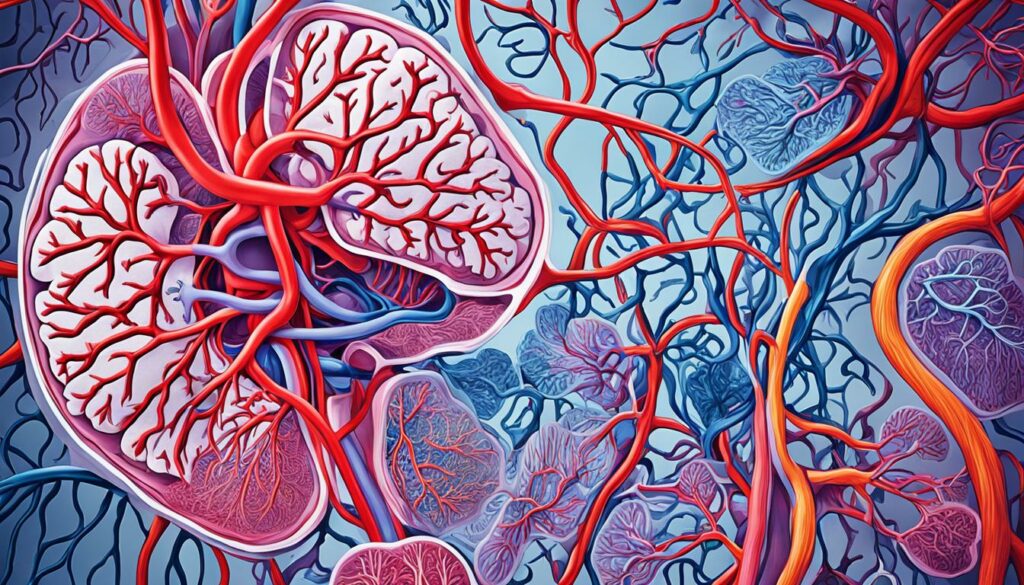Did you know that over 30 million men in the United States are affected by erectile dysfunction (ED)? This common condition can have a significant impact on a person’s quality of life, relationships, and self-esteem.
While there are various treatment options available, including medications and therapies, research has also shown promising results for a natural remedy: folic acid.
Key Takeaways:
- Folic acid deficiency is associated with erectile dysfunction.
- Supplementing with folic acid may improve erectile function.
- Folic acid plays a crucial role in cell growth, DNA production, and nitric oxide production.
- Consult with a healthcare provider before starting folic acid supplementation.
- Folic acid is an affordable and easily accessible option for ED treatment.
Understanding the Causes of Erectile Dysfunction
Erectile dysfunction (ED) can be attributed to various factors that can affect a man’s ability to achieve and maintain an erection. It is essential to understand these underlying causes to effectively address and treat this condition. Common causes of erectile dysfunction include:
Hormonal Disorders
Hormonal imbalances, such as low testosterone levels, can contribute to erectile dysfunction. Testosterone is a crucial hormone responsible for sexual function, and any disruptions in its production or regulation can impact erectile health.
Cardiovascular Disease
Cardiovascular disease, including conditions like atherosclerosis (a buildup of plaque in the arteries), high blood pressure, and diabetes, can restrict blood flow to the penis. Insufficient blood flow to the genital area can lead to difficulties in achieving and sustaining an erection.
Anxiety and Depression
Psychological factors, such as anxiety and depression, can significantly impact sexual function. Stress, performance anxiety, and negative emotions can interfere with the brain’s ability to send signals for the body to initiate and maintain an erection.
Lifestyle Factors
Lifestyle choices also play a significant role in erectile dysfunction. Smoking, excessive alcohol consumption, and leading a sedentary lifestyle can contribute to the development of ED. These lifestyle factors can negatively affect blood circulation and overall cardiovascular health, hampering erectile function.
Addressing the underlying causes of erectile dysfunction is crucial for successful treatment. While folic acid supplementation shows potential benefits, it’s essential to consider a holistic approach that takes into account hormonal balance, cardiovascular health, mental well-being, and healthy lifestyle choices.
| Causes of Erectile Dysfunction | Description |
|---|---|
| Hormonal disorders | Imbalances in testosterone levels and other hormones affecting sexual function |
| Cardiovascular disease | Atherosclerosis, high blood pressure, and diabetes leading to restricted blood flow |
| Anxiety and depression | Psychological factors impacting the brain’s ability to stimulate and maintain an erection |
| Lifestyle factors | Smoking, excessive alcohol consumption, and sedentary lifestyles affecting blood circulation and overall health |

Understanding the causes of erectile dysfunction is essential for tailored treatment plans. By addressing hormonal imbalances, managing cardiovascular health, addressing psychological well-being, and adopting a healthy lifestyle, individuals can improve their chances of overcoming this condition and regaining their sexual health.
The Role of Folic Acid in the Body
Folic acid, a B vitamin, plays a crucial role in various essential functions within the body. Its importance spans across cell growth and division, DNA and RNA production, and the maintenance of overall health and well-being. Let’s explore the significance of folic acid in detail.
Cell Growth and Division
Folic acid is vital for proper cell growth and division. It supports the development of new cells and tissues, ensuring healthy growth and repair processes throughout the body.
DNA and RNA Production
Folic acid is responsible for the synthesis and stability of DNA and RNA, the genetic materials that contain important instructions for cell function. It aids in the production of these crucial molecules, facilitating normal cellular processes.
Homocysteine Regulation
Folic acid helps regulate homocysteine, an amino acid associated with an increased risk of cardiovascular disease. Adequate levels of folic acid help maintain healthy homocysteine levels, promoting heart health and reducing the risk of related conditions.
Prevention of Birth Defects
Pregnant women are advised to consume sufficient folic acid to prevent birth defects in their babies. Adequate folic acid intake during pregnancy is crucial for proper fetal development, particularly in the formation of the neural tube, which eventually becomes the baby’s brain and spinal cord.
Cancer Prevention
Research suggests that folic acid may play a role in reducing the risk of certain cancers, including colorectal, breast, and pancreatic cancers. It is believed to have protective effects on DNA integrity and regulation, potentially lowering the chances of cancerous cell growth and proliferation.
Mental Health
Folic acid has been associated with improved mental health and well-being. Studies have shown that it may help reduce symptoms of depression and anxiety, supporting overall cognitive function and emotional stability.
Overall, the role of folic acid in the body encompasses crucial functions like cell growth and division, DNA and RNA production, homocysteine regulation, prevention of birth defects, cancer prevention, and mental health support.
Ensuring an adequate intake of folic acid through nutrient-rich foods or supplements can contribute to a healthier and more vibrant life.

Research Studies on Folic Acid and Erectile Dysfunction
A meta-analysis was conducted to investigate the association between folic acid and erectile dysfunction (ED). The analysis included several research studies that compared serum folic acid levels between ED patients and healthy subjects.
The findings revealed a significant association between folic acid deficiency and ED, as ED patients had lower levels of folic acid compared to their healthier counterparts.
Furthermore, the meta-analysis delved into the treatment efficacy of folic acid for ED patients. After folic acid supplementation, improvements in erectile function were observed in the study participants. These findings suggest that folic acid may offer a potential treatment option for individuals with erectile dysfunction.
To summarize, research studies and a meta-analysis have demonstrated a clear association between folic acid and erectile dysfunction.
Folic acid deficiency has been linked to an increased risk of developing ED, while folic acid supplementation has shown promise in improving erectile function. These insights contribute to a growing body of evidence highlighting the potential benefits of folic acid in the management of ED.
| Research Studies on Folic Acid and Erectile Dysfunction | Key Findings |
|---|---|
| Association between folic acid and ED | ED patients have lower levels of folic acid compared to healthy subjects |
| Treatment efficacy of folic acid for ED | Folic acid supplementation leads to improvements in erectile function |
Conclusion
In conclusion, folic acid supplementation holds promise as a potential treatment for erectile dysfunction (ED). Research has shown a correlation between folic acid deficiency and ED, and supplementation with folic acid has been found to improve erectile function in men with ED.
These findings suggest that folic acid may offer a natural and effective solution for those seeking to address ED.
However, it is crucial to consult with a healthcare provider before initiating folic acid supplementation or any other treatment for ED. A healthcare provider can provide personalized guidance based on individual needs and medical history.
They can also evaluate potential interactions with other medications and ensure the correct dosage of folic acid is administered.
By consulting a healthcare provider, individuals can make informed decisions regarding their ED treatment and optimize their chances for success. This collaboration between patients and healthcare providers is essential in achieving the desired outcome and ensuring overall well-being.
FAQ
Can folic acid help with erectile dysfunction?
Folic acid has shown potential benefits for treating erectile dysfunction. Studies have found an association between folic acid deficiency and ED, and supplementing with folic acid has been shown to improve erectile function.
What are the causes of erectile dysfunction?
Erectile dysfunction can be caused by various factors, including hormonal disorders, cardiovascular disease, anxiety, depression, and lifestyle factors such as smoking, excessive alcohol consumption, and a sedentary lifestyle.
What is the role of folic acid in the body?
Folic acid, a B vitamin, plays a crucial role in cell growth and division, as well as in the production of DNA and RNA. It helps maintain healthy levels of homocysteine, which is linked to cardiovascular disease. Folic acid is particularly important for pregnant women in preventing birth defects and has also been associated with reduced cancer risk and improved mental health.
What do research studies say about folic acid and erectile dysfunction?
Research studies, including a meta-analysis, have found an association between folic acid deficiency and erectile dysfunction. The meta-analysis also showed improvements in erectile function after folic acid supplementation, suggesting that folic acid may be an effective treatment option.
Should I consult a healthcare provider before taking folic acid for erectile dysfunction?
Yes, it is important to consult with a healthcare provider before starting folic acid supplementation or any other treatment for erectile dysfunction. They can provide proper guidance and determine the most suitable treatment approach based on individual needs and medical history.




